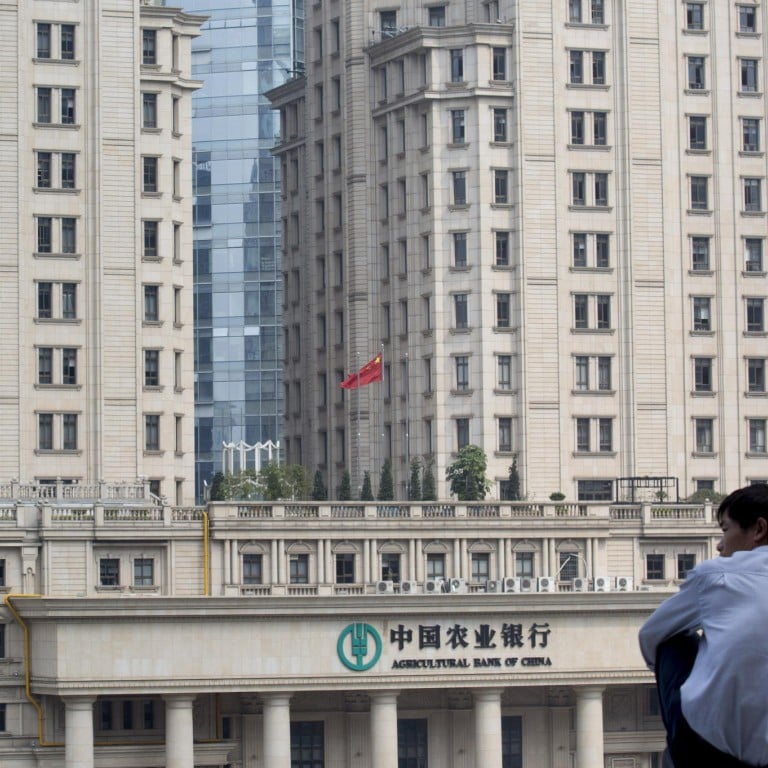
Weak money supply growth hits markets
M2 expansion of 12.1pc for March is the lowest on record, reflecting tight credit on the mainland and sparking sell-offs in share and money markets
The mainland's money supply last month expanded at its weakest pace ever, triggering sell-offs in the stock and money markets yesterday.
M2, an indicator of money supply, grew 12.1 per cent at the end of March from a year earlier, the slowest year-on-year growth since monthly data was first reported in 1997 and well below the central bank's annual growth target of 13 per cent this year.
The slowdown in M2 reflects the still tight credit conditions as the economy is widely expected to have grown in the first quarter at the slowest pace in five years.
New yuan loans rose to 1.05 trillion yuan in March from 644.5 billion yuan in the previous month, reflecting a seasonal increase in lending. But the new loans were still 12.4 billion yuan lower than a year earlier. The weakness in money supply before the release of official economic data today sent the one-year rate swap to a one-month low. The Shanghai Composite Index slid 1.4 per cent, the biggest decline in five weeks.
Hong Kong stocks fell the most in almost a month. The Hang Seng Index dropped 1.6 per cent to 22,671.26 points, erasing gains since plans for cross-border equity trading with Shanghai's exchange were announced April 10. All but three shares fell on the 50-member gauge. The H-share index dropped 2.1 per cent to 10,028.74 points.
Analysts, however, say credit may not be as tight as M2 growth indicates and that industrial demand may have picked up quietly, partly reflected in the fast rise of medium to long-term loans, which is likely to support an economic rebound as early as this quarter.
"The M2 growth, distorted by a high comparison base a year earlier, has actually stayed within an expected range. A money supply rebound in the second quarter is almost certain, driven by demand in the real economy," Lu Zhengwei, the chief economist at Shanghai-based Industrial Bank, told the
The easing in M2 comes after a 13.3 per cent rise at the end of February and a 15.7 per cent growth in March last year.
Sheng Songcheng, the head of the statistics department of the People's Bank of China, predicts M2 to recover starting this quarter, with its annual growth seen to reach at least the 13 per cent target, according to local media reports. Last year, M2 expanded 13.6 per cent.
Total social financing, a broader gauge of credit supply, reached 5.6 trillion yuan (HK$7 trillion) in the first quarter, down 9.3 per cent from a year earlier, after regulators tightened the screws on shadow banking.
According to a report by , the China Banking Regulatory Commission rolled out a new guideline recently to tighten controls on trust companies, requiring them to build a mechanism to ensure liquidity and capital replenishment.
New medium to long-term corporate loans, mostly used to finance infrastructure building, rose to 325 billion yuan last month from 291 billion yuan in February.
Corporate bond issues reached 252 billion yuan in March, also much higher than the monthly average of 66.4 billion yuan in the first two months.
Some economists urged the central bank to take steps, such as cutting banks' reserve requirement ratio, to lower financing costs.
Nomura International chief China economist Zhang Zhiwei said local governments' financing platforms were issuing bonds at interest rates of more than 8 per cent, compared with the average of 5 per cent to 6 per cent last year.
The mainland's foreign-exchange reserves rose to US$3.95 trillion at the end of March, a gain of US$129 billion in three months.
Economists expect the yuan to face renewed appreciation pressures after the country recorded a trade surplus last month. But observers note capital inflow has slowed and a net outflow could be on the cards in the months ahead following the yuan's recent weakness.
Additional reporting by Bloomberg

